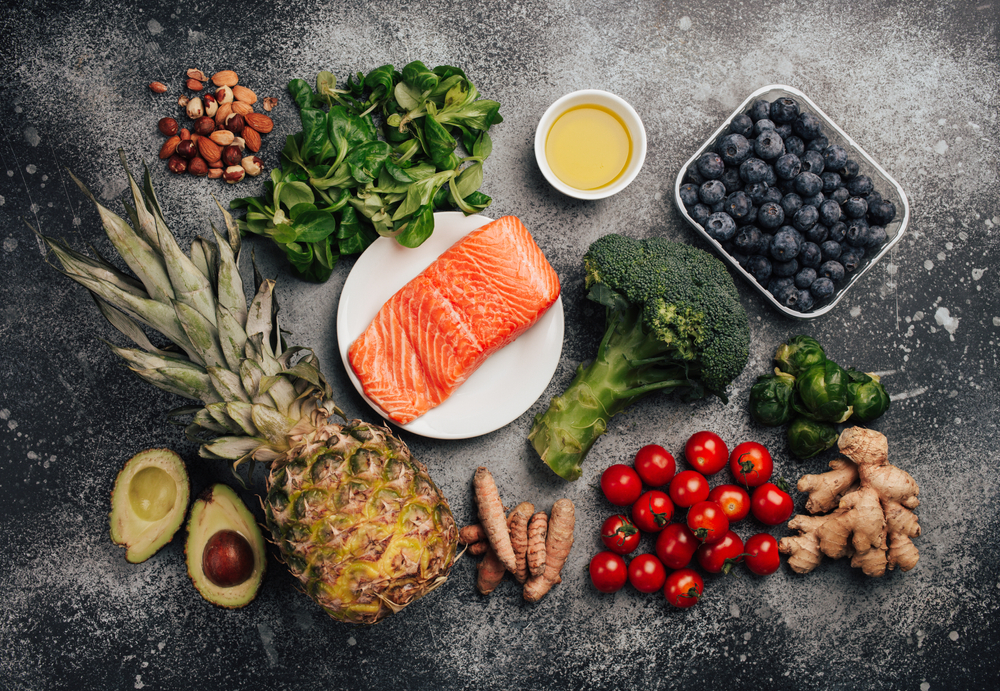
Inflammation is a natural response by the body’s immune system to fight off injury, infection, or toxins. However, chronic inflammation — when your body is in a prolonged state of alert — can lead to a host of health problems, including heart disease, diabetes, arthritis, and even certain cancers. While inflammation is part of the body’s defense mechanism, it is essential to manage it to avoid long-term health issues. The good news is that you can reduce inflammation naturally through lifestyle changes, dietary adjustments, and stress management.
1. Adopt an Anti-Inflammatory Diet
One of the most powerful tools to fight inflammation is right in your kitchen. Certain foods have been scientifically proven to have anti-inflammatory effects, while others can exacerbate inflammation.
A. Focus on Whole, Plant-Based Foods
The foundation of an anti-inflammatory diet is whole, nutrient-dense foods, particularly fruits and vegetables. These foods are rich in antioxidants, vitamins, and minerals, all of which play a crucial role in reducing oxidative stress and inflammation in the body.
- Fruits like berries (blueberries, strawberries, raspberries) are rich in antioxidants such as anthocyanins, which have anti-inflammatory properties.
- Leafy greens such as spinach, kale, and Swiss chard are packed with vitamins and phytonutrients that help combat inflammation.
- Cruciferous vegetables like broccoli, cauliflower, and Brussels sprouts contain sulforaphane, a compound that may help block inflammatory pathways.
B. Include Omega-3 Fatty Acids
Omega-3 fatty acids are among the most potent natural anti-inflammatories. These essential fats help reduce the production of inflammatory molecules such as prostaglandins and cytokines.
- Fatty fish like salmon, sardines, mackerel, and herring are high in omega-3s.
- For plant-based sources, consider chia seeds, flaxseeds, and walnuts.
- Omega-3 supplements such as fish oil or algae oil are another option if you struggle to get enough from food alone.
C. Choose Healthy Fats
Healthy fats are essential for reducing inflammation. In contrast, processed and trans fats can increase inflammation and are associated with a higher risk of chronic diseases.
- Opt for extra-virgin olive oil, which contains oleocanthal, a compound with anti-inflammatory properties similar to ibuprofen.
- Avocados are another excellent source of heart-healthy fats and contain antioxidants like carotenoids that may reduce inflammation.
D. Spices and Herbs as Natural Anti-Inflammatories
Certain spices and herbs have strong anti-inflammatory effects and can easily be incorporated into your meals.
- Turmeric contains curcumin, a compound that has been shown to inhibit inflammation at the molecular level. Curcumin is more effectively absorbed when consumed with black pepper.
- Ginger has anti-inflammatory and antioxidant properties that can help reduce inflammation in the body.
- Garlic contains sulfur compounds that may block inflammatory pathways and is associated with reduced inflammation.
2. Avoid Inflammatory Foods
Just as certain foods can reduce inflammation, others can trigger or worsen it. Limiting or avoiding inflammatory foods is crucial for maintaining a healthy balance in the body.
A. Refined Carbohydrates and Sugars
Foods that are high in refined sugars and processed carbohydrates spike blood sugar levels, which can lead to increased production of pro-inflammatory cytokines. Examples include:
- Sugary drinks like soda and sweetened teas.
- Sweets, pastries, and candy.
- Processed bread, white rice, and pasta.
Instead, choose complex carbohydrates like whole grains, legumes, and vegetables that provide fiber, which can help control inflammation by feeding beneficial gut bacteria.
B. Trans Fats and Processed Foods
Trans fats, often found in fried and processed foods, are directly linked to higher inflammation levels. These unhealthy fats can trigger the release of inflammatory chemicals and increase your risk for heart disease and other chronic conditions.
- Avoid margarine, partially hydrogenated oils, and fast food.
- Minimize consumption of processed snacks, frozen meals, and packaged foods.
C. Excessive Alcohol
While moderate alcohol consumption (such as a glass of red wine) can have some anti-inflammatory benefits due to its antioxidant content, excessive drinking can have the opposite effect. Chronic alcohol consumption has been linked to increased levels of inflammatory markers in the body.
3. Engage in Regular Physical Activity
Exercise is a powerful tool to reduce inflammation naturally. Physical activity helps lower levels of inflammatory markers in the blood, such as C-reactive protein (CRP), and promotes the production of anti-inflammatory compounds. Moderate exercise, in particular, has been shown to have the most beneficial effects on inflammation.
A. Aim for Consistency
Consistency is key when it comes to exercise and reducing inflammation. Aim for at least 30 minutes of moderate exercise, like brisk walking, cycling, or swimming, five days a week. Activities such as yoga, tai chi, and Pilates are also excellent options, as they combine physical movement with relaxation techniques, both of which contribute to lower inflammation levels.
B. Avoid Overexercising
While moderate exercise reduces inflammation, overtraining or high-intensity exercise without adequate rest can cause an increase in inflammation due to physical stress on the body. Ensure that you allow your body to recover by incorporating rest days and practicing gentle exercises when needed.
4. Manage Stress Levels
Chronic stress is a significant contributor to inflammation. When the body is under prolonged stress, it produces more cortisol, a hormone that can cause an imbalance in your immune response, leading to inflammation.
A. Practice Mindfulness and Meditation
Mindfulness meditation and deep breathing exercises have been shown to reduce inflammation by lowering stress hormone levels and decreasing the body’s inflammatory response. Simple practices like focusing on your breath, meditating for 10-15 minutes a day, or doing a body scan meditation can significantly reduce stress.
B. Prioritize Self-Care
Incorporating self-care routines, such as taking a warm bath, reading a book, or enjoying a hobby, can also help manage stress. Taking regular breaks and disconnecting from work or digital devices are vital for preventing burnout and reducing stress-related inflammation.
5. Get Adequate Sleep
Quality sleep is one of the most critical factors for reducing inflammation naturally. During sleep, your body repairs damaged tissues and reduces inflammation. Poor sleep habits, on the other hand, can elevate inflammatory markers and weaken the immune system.
A. Aim for 7-9 Hours of Sleep
Adults should aim for at least 7-9 hours of uninterrupted sleep per night to allow the body enough time to heal and regulate inflammation. If you have trouble falling asleep or staying asleep, establish a bedtime routine, limit screen time before bed, and create a comfortable sleep environment.
B. Address Sleep Disorders
If you struggle with chronic sleep issues like insomnia or sleep apnea, it’s important to address these conditions, as they can significantly contribute to inflammation. Speak to a healthcare provider about treatment options or lifestyle changes that can improve your sleep quality.
6. Maintain a Healthy Weight
Excess body fat, especially around the abdomen, is a known contributor to chronic inflammation. Fat cells produce pro-inflammatory substances called cytokines, which can lead to increased inflammation in the body. By maintaining a healthy weight through diet and exercise, you can reduce inflammation and improve overall health.
A. Focus on Sustainable Weight Loss
Crash diets or extreme calorie restrictions can increase stress on the body and exacerbate inflammation. Instead, aim for a gradual, sustainable approach to weight loss that includes a balanced diet, regular exercise, and stress management.
7. Consider Natural Supplements
In addition to making dietary and lifestyle changes, certain natural supplements may help reduce inflammation in the body.
- Curcumin (the active compound in turmeric) is one of the most well-studied supplements for reducing inflammation. Look for curcumin supplements with black pepper extract (piperine) to enhance absorption.
- Fish oil supplements are rich in omega-3 fatty acids and can help lower inflammation, especially in people who don’t consume enough fish.
- Ginger supplements or teas may also help reduce inflammation, particularly for conditions like arthritis.
Always consult a healthcare professional before starting any new supplements, especially if you are on medication or have underlying health conditions.
Chronic inflammation can lead to a wide range of health issues, but the good news is that you can reduce inflammation naturally by making lifestyle and dietary changes. By incorporating an anti-inflammatory diet, exercising regularly, managing stress, getting enough sleep, and maintaining a healthy weight, you can significantly reduce inflammation and improve your overall health. With consistent, mindful efforts, it’s possible to lower inflammation and enhance long-term well-being.







